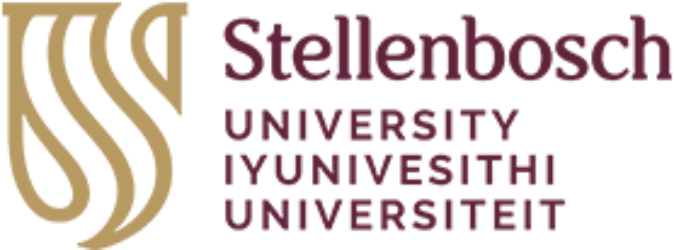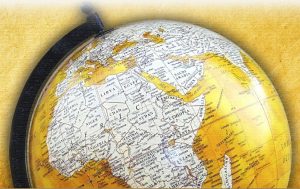A particularly valuable, rich and unique manuscript collection has recently been donated to the Stellenbosch University (SU) Library and Information Service. The Maguire San Ethnobotanical Collection consists of data collected by Mr Brian Maguire between 1954 and 1972 in close collaboration with Ju|’hoan (previously known as !Kung or !Khu) and ǃXoõ (previously known as !Kõ) communities in the Kalahari.
According to Dr Judy Maguire, her husband, Brian Maguire, became the field assistant to Prof Raymond Dart of “Australopithecus” fame in the 1960s and was researching the potential food plants of early hominids. “During this time he undertook comparative studies of the !Kõ hunter-gatherers in Central Western Botswana, especially as they were a group who had no annual, storable plant food staple to rely on such as the Manketti nuts of the !Kung (!Khu), and no permanent source of water either.
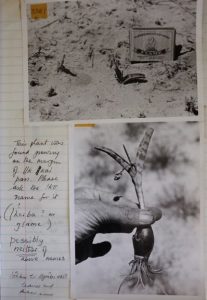
“Many hundreds of photographs were taken at this time, in the context of food gathering, the plant communities of economically important food and medicinal plants, the plants themselves as well as the parts that are eaten. Food preparation was also photographed. It was already apparent at this time that acculturation was taking its toll.
“Prior to this time, Maguire had gained experience as ethnobotanist to the Brock-Harvard-Peabody medical and the Marshall ethnological excursions to the !Kung of SWA during the 1950s, at a time when almost nothing had been recorded concerning the food and medicinal plants of indigenous populations.
“Subsequently, Brian Maguire (1978) completed an MSc (cum laude) entitled The Food Plants of the !Khu Bushmen of North Eastern South West Africa (Namibia). The work was undertaken at a time when little if anything was known about the subsistence ecology of the !Kung, and observations were made at a time when acculturation and impacts on their food-gathering practices were minimal. He died prematurely whilst busy with a Ph.D. on the !Kõ subsistence ecology and finalising the work on the potential vegetable dietary of early hominids in the then Transvaal.”
The collection, consisting of manuscripts, typescripts, sketches, diagrams, photographic prints, black and white negatives, colour slides, field notebooks and plant collection registers, is of great scientific, research, national and heritage importance. It was the wish of the late Mr Maguire and is still the wish of Dr Judy Maguire that the collection becomes a usable resource which can be shared with younger generations. It offers the opportunity to learn from our forefathers about the sustainable use our indigenous plants in an African context.
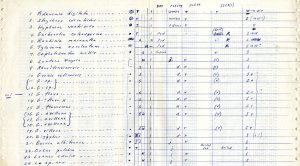
A significant portion of the physical collection has been digitised and these digital records will be made openly available for research purposes on the Library’s Digital Heritage Repository, SUNDigital Collections. The addition of the collection will ideally complement other digital heritage and natural heritage collections currently on the repository such as the Rudolf Marloth botanical illustrations collection and the James Walton vernacular architecture collection, which includes information and images of various artefacts of Southern African indigenous people.
The physical collection will be hosted in the Manuscript Section of the Special Collections division in the Library in due course. Once again, the collection will enrich current holdings and complement collections such as the Robert Broom, John Muir, BIC van Eeden and Jan Anthonie Engelbrecht collections, all of which relate to indigenous botany, zoology, languages and early customs.
Dr Maguire believes that the knowledge locked in the collection can be used to “assess the attrition of indigenous knowledge systems, and to achieve a better understanding of the context of knowledge transmission – its connection to language loss for example (plant names) and to understand what factors could help to preserve the transmission of knowledge before it disappears with increasing modernisation and acculturation of communities”.
The comprehensive, meticulously documented collection was brought to the attention of the Library by Dr Kerry Jones, Research Associate at SU and Postdoctoral Researcher in Linguistics at Rhodes University. Dr Jones was instrumental in the sorting and digitisation of the collection in collaboration with Dr Maguire and will continue to work on the collection in collaboration with mother tongue speakers in the future.
Liaise with Mimi Seyffert-Wirth, Deputy Director: Digital Scholarship (Library and Information Service) at mseyf@sun.ac.za for more information.
Mimi Seyffert-Wirth
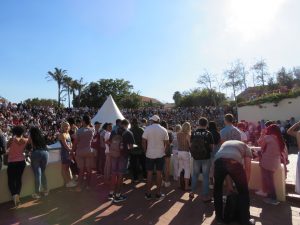
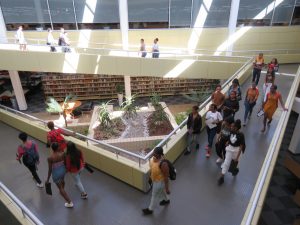
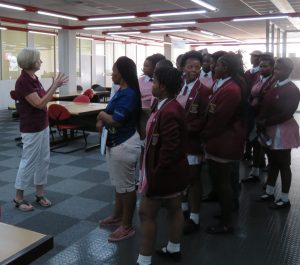 More than 1 760 visitors explored the Stellenbosch University Library on SU Open Day, Saturday 29 February 2020. Future students and their parents had the opportunity to experience the Library first-hand. They were welcomed by library staff and most visitors explored the Library unaccompanied, but some groups and families were, however, keen to be given a brief tour. Many alumni had brought their children to see “their Library”. Visitors were impressed with the Library and the staff.
More than 1 760 visitors explored the Stellenbosch University Library on SU Open Day, Saturday 29 February 2020. Future students and their parents had the opportunity to experience the Library first-hand. They were welcomed by library staff and most visitors explored the Library unaccompanied, but some groups and families were, however, keen to be given a brief tour. Many alumni had brought their children to see “their Library”. Visitors were impressed with the Library and the staff.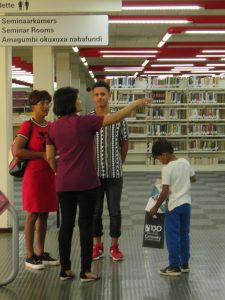
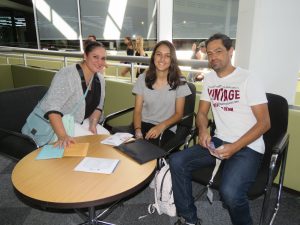
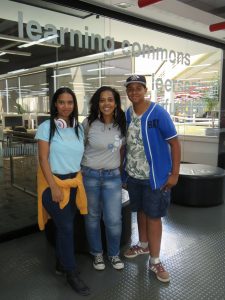
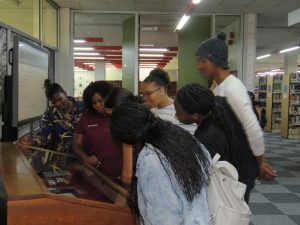 The more than 217 visitors to the Special Collections Division showed enthusiasm to see and learn from the staff about the material the Division takes care of.
The more than 217 visitors to the Special Collections Division showed enthusiasm to see and learn from the staff about the material the Division takes care of.